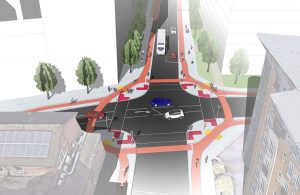Salford and Eccles MP, Rebecca Long-Bailey, has given a scathing assessment of the government’s green industrial revolution plan.
Speaking on Wednesday evening’s Peston programme on ITV, she described the proposed £12 billion investment in low-carbon industry as “paltry”.
She went even further to suggest that the amount was so low, it was as if the interests of polluters were being protected.
The MP, who has been in office since May 2015, said that since £8 billion had already been announced, the new scheme equates to a lower total of £4 billion of new investment.
Long-Bailey said that the UK’s attempts to reduce carbon emissions are financially dwarfed by other nations.
She said: “It’s not enough, not when you look at other countries such as Germany, who are taking this seriously and they’ve got a 40 billion [pound] investment package”.
Long-Bailey, who was the Shadow Secretary for Business, Energy and Industrial Strategy up until April 2020, argued that with a relatively low amount of money, far-reaching benefits will be missed.
She added: “the sad reality here is – we’ve got an opportunity to [not only] tackle climate change, but also to rebuild our economy.”

Green revolution across industry
On Wednesday, Boris Johnson announced a 10-point plan for the UK that aims to create 250,000 new jobs in industries that contribute to lowering carbon emissions.
The green industrial revolution plan, the same title as that put forward by the Labour MP last year, will push for investment across energy and transport sectors in the UK.
The proposals outline developing low-carbon technologies including in energy production and transport to reduce the UK’s carbon footprint and try to meet their Paris Climate Agreement targets.
The plans also include ending the sale of new petrol and diesel cars by 2030 and a promise for £5 billion of spending nationally on public transport, cycling and walking.
Local Connection
The result could mean more developments like Salford City Council’s proposals for new cycling and pedestrian improvements around Oldfield Road.
The four-week consultation period for the scheme ended on Monday, with the new plans taking into account feedback and safety concerns.
Councillor Jim Cammell, who leads on cycling, said: “Our design team are exploring several opportunities to make cycling and walking along this route more attractive, more direct and safer, especially at road junctions.”
The scheme includes a ‘Cycle Optimised Protected Signals’ (CYCLOPS) junction.
The CYCLOPS junction involves pedestrians and cyclists being separated from traffic and given a safer, signal-controlled route that optimises travelling for all users.
It would follow the first of its kind in the UK that opened in July this year in Hulme and is is part of the £13.4m Manchester to Chorlton Cycleway.

It is hoped that investment like this can reduce carbon emissions through the promotion of safer walking and cycling routes and lowering the reliance on cars.
And Salford City council believe the improvements will help capitalise on the huge increase in cycling in the region since the pandemic.
The works could be seen as an example of what the green industrial revolution will look like for everyday road users.
Manchester City Council video of the CYCLOPS junction on Royce Road, Hulme
Protecting polluters?
Rebecca Long-Bailey had spearheaded the inclusion of a green industrial revolution policy into the 2019 Labour Manifesto.
Whilst it set out similar plans to those of the government, the financial commitments proposed were significantly larger.
Speaking from the ITV Salford studio, Long-Bailey asserted that the government, however, is pulling its punches when it comes to tackling climate change through innovation.
She said: “It was Goldman Sachs not Greenpeace who showed that there was 16 trillion dollars to be made worldwide by investing in renewable technologies but yet again, we’ve got a government that does not want to seize this opportunity and I just question why?”
Long-Bailey, went further to suggest that the measures announced by the Prime Minister were insufficient to the point of appearing as if they were serving the interests of polluting companies.
She added: “The only reason that I can possibly see is that they want to protect the interest of polluters.
And I want them to prove me wrong because if they really are serious about tackling climate change, they’ve got up their game and they’ve got to do it urgently.”














Recent Comments